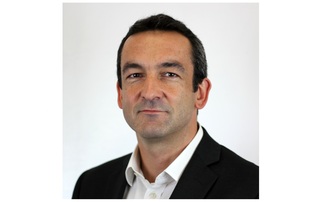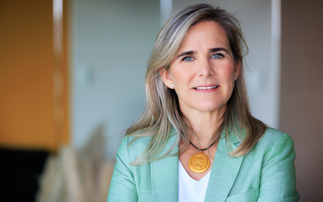
Ashley Hamilton Claxton, head of responsible investment at Royal London Asset Management, talks to BusinessGreen about unwavering corporate commitment to decarbonisation, ethical AI, and green superpowers
BusinessGreen: What was your first role in the green economy and what attracted you to the sector?
Ashley Hamilton Claxton: I came to the green or sustainable investment industry by accident and via the curiosity of a student. While studying for my Masters Degree at the University of British Columbia (Canada) back in 2004, I 'discovered' corporate social responsibility, or CSR as it was called at the time. I was drawn to the idea that big corporations should have an obligation to society and to protect the environment. I started to explore the role that shareholders play in either encouraging or discouraging good corporate behaviour. I was fascinated to discover the concept of 'shareholder activism' and company engagement as a tool to change how companies behave. I was fortunate to get a job doing just that - engaging with companies on behalf of shareholders to encourage real world change. I started doing this for small investors in Canada, and eventually landed in the UK and found myself working for a mutually-owned asset manager.
What parts of the green economy are you most excited about?
We believe digitisation, decarbonisation, and healthcare are three of the most powerful and durable long-term societal and investment trends and are a core part of sustainable investing.
Digitisation is an area which was supercharged by the pandemic as working from home and hybrid working became more embedded in society. As this has lessened as a driver of future digitisation, generative artificial intelligence (AI) has come along to increase investor interest in this area again. Like all forms of new technology, hype and fact need to be carefully separated, but it seems to us that this form of AI will be transformative. The first reason for this is the speed in which it has been released. It took seven years to reach 100 million internet users, while it has taken two months for generative AI to hit the same number. Never has such a powerful piece of technology been scaled so fast. Although there will inevitably be concerns about this, the productivity and skills improvement that will come along with it could solve many of the problems, including inflation and shortage of labour, that we see today.
The second area is decarbonisation. On some levels this has seen something of a setback as the war in Ukraine and subsequent withdrawal of Russian gas has meant more coal has had to be burnt to create the energy needed in Europe and elsewhere. The recent roll-back of net zero initiatives by some governments has also increased the sense that decarbonisation is being put on hold. At the corporate level though, nothing could be further from the truth. Carbon is an expensive commodity. Most corporates see this through the energy they use. Energy efficiency, and cheaper forms of energy such as solar, are effective cost-saving mechanisms regardless of the environmental implications of carbon burning. Also, many companies will only deal with other companies that are in turn committed to their own decarbonisation, because supply chain carbon emissions will impact calculations of the carbon intensity of their own businesses. These factors are creating a strong drive to decarbonisation whatever the political backdrop.
Finally, healthcare outcomes are on a defined and improving trend. This is not new, but there are new disease categories, such as obesity and Alzheimer's, which are now becoming treatable. This adds to the increasing treatability of other areas such as cancer, which could lead to this disease becoming a chronic, rather than fatal one, within the next decade or so.
What developments do you think are currently under the radar?
Ethical AI - AI has become something of a 'hot topic' in recent years with lots of focus, speculation, and concern over the world's most influential digital technology. We have seen the positive capabilities of AI in improving accuracies in medical diagnosis and increasing accessibility for people with disabilities, however we have also seen the risks of harm such as invasion of privacy and bias and discrimination. Technology companies need to adopt, implement, and disclose robust governance policies and controls, backed by strong ethical principles. We have joined the World Benchmarking Alliance's (WBA) Collective Impact Coalition (CIC) for Ethical AI to encourage companies we invest in to implement policies and mechanism to ensure the ethical development and application of AI.
What is the biggest misconception about the green economy?
There has been a narrative building that the trends towards sustainability have come to an end. However, there has been investor surprise at how well Royal London Asset Management's Sustainable range performed in 2023. In part, this is due to a difficult year in 2022 for most growth-orientated and oil-shy funds, including sustainable ones. It is also down to there being a large disparity between the best and worst performing sustainable funds in recent years. If we think of digitisation, decarbonisation, and healthcare as three of the most powerful and durable long-term societal and investment trends, and we also accept these are a core part of sustainable investing, then we would argue one logical conclusion is that sustainability and sustainable investing is far from ending, it is getting stronger.
What do you see as the biggest challenges to the net zero transition?
We see the following three things as the biggest challenges but also the main drivers influencing investors and corporate engagement to achieve net zero:
1. Technology and policy disruptions - Geopolitical tensions and renewable energy impacts could lead to a potentially disorderly transition. The gap between developed and emerging markets remains a key challenge.
2. Increased pressure on climate adaptation - with climate risks becoming more apparent, especially with the 'El Niño' cycle (associated with heavy rains, floods and droughts), we expect the focus on adaptation needs to grow. Despite having received less attention than mitigation so far, we believe that action on climate adaptation offers clear financial benefits.
3. New data, new standards and new regulation - the financial markets are being challenged by disclosures under ISSB standards, new taxonomies, and labelling regulations. Success will depend on the widespread adoption and effective use of these new frameworks.
What advice would you give to someone looking to work in the green economy?
The green economy is such a growing area with so many different opportunities and paths to take in a career in the green economy as the UK Green Business Awards highlights with its many categories. My advice would be to pick a company that aligns to your values and where you will be able to have a real impact.
You were a finalist at this year's UK Green Business Awards, can you tell us a little bit about your work to advance the green economy?
At Royal London Asset Management, we have been dedicated to constructing and managing sustainable funds for over 20 years, and have successfully grown this from a 'niche' area to a major part of our business, through an extended period of education around the potential benefits of sustainable investing in general, as well as our specific approach. Different investors are comfortable with different levels of risk and have other specific objectives (e.g. around geographical location of investments). Our sustainable fund range reflects this, with varying combinations of UK and global equities and bonds. The first of our Sustainable funds was launched in 1990, but the process used today was first introduced in 2003, with ongoing enhancements and evolution of our approach since then. When engaging on ESG issues, we focus our time and attention on issues we feel are most material to our investments, and where we think engagement can have the biggest impact on ESG outcomes. We do this by focusing on six key themes. These are chosen following a review of trends and events, alongside extensive consultation with fund managers, responsible investment analysts, clients and other stakeholders.
What projects or achievements are you most proud of?
For a number of years, we have been advocating for a 'just transition' which asks companies and governments to consider the social implications of moving to a low-carbon economy. Since 2019, we have partnered with Friends Provident Foundation, championing an inclusive approach to climate action, ensuring the 'just transition' concept avoids deepening existing injustices. We have woven this principle - mentioned in the Paris Agreement - into our net zero engagements, climate transition plans and advocacy efforts, contributing to its growing mainstream acceptance among companies and investors. We are delighted that this concept is now becoming mainstream for companies and investors.
What can the green economy do to better promote its successes?
The green economy has its challenges just by nature of what it is trying to achieve. However we believe we should celebrate the small wins better and focus on the positives of how far we have come and difference our efforts have made.
What would your green superpower be?
The ability to uncover real, emerging/important ESG trends. We are constantly reading and receiving information and research from a myriad of sources. With so much to be done in the green economy it can be hard to narrow down our focus. The ability to uncover the most meaningful and important ESG issues would allow us to influence real world change in the most efficient and beneficial manner. While we currently still lack that superpower, in order to pick our priority engagement themes we collaborate across our investment teams and clients and undertake a review of our engagement themes and topics every two years. This helps us identify the most relevant issues for our investments, ensuring we deploy our resources effectively. We look at trends and emerging issues identified by organisations like the World Economic Forum or the Principles for Responsible Investment and consult with our clients and investment teams.
Royal London Asset Management was a sponsor of this year's UK Green Business Awards.







